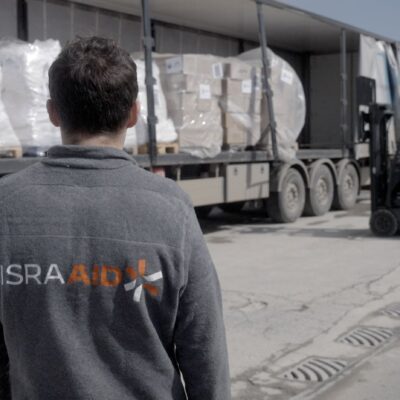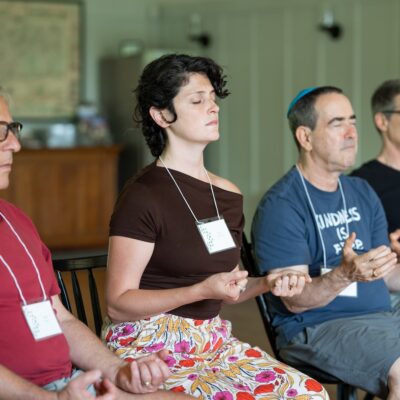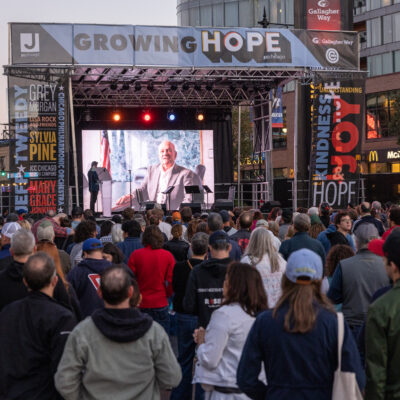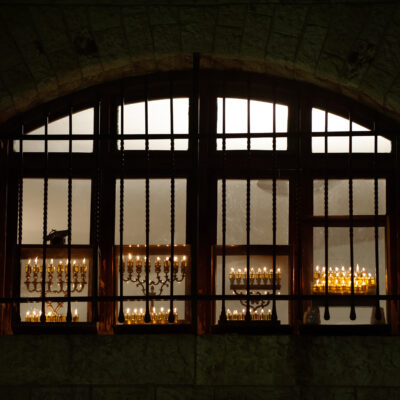Opinion
READERS RESPOND
We’re permanently seeing red
The authors of this piece engaged with Barry Finestone’s article “Getting the Jewish workforce out of ‘The Red Zone’” (eJewishPhilanthropy, March 11) in a variety of different spaces, representing a cross section of Jewish communal professionals if not a fully representative sample of all demographics, communities or organizations. Our response here is inspired by a specific discussion that emerged in the Year of the Jewish Woman (& Allies) Facebook group and the public comments and private dialogue that it produced, incorporating the breadth of perspectives of the 5,100 members in that network who represent the diversity of the Jewish community. We imagine that Finestone’s op-ed inspired conversation across many parts of the Jewish community, and especially at the Jewish Funders Network conference, as the original piece was directed to funders. When our piece refers to “we,” our effort is to include the many others with whom we believe our perspective will resonate. Both anecdotal evidence and data tell us that what we share here is not the minority experience. We write in service to the community.
Red Zones and Blue Zones: it sounds like an election year struggle, but instead it’s a Jewish communal one. Many Jewish communal professionals were deeply affected by Barry Finestone’s thoughtful piece “Getting the Jewish workforce out of ‘The Red Zone’,” written as a call to funders and reflecting on professional coaching expert Susan Britton’s Red and Blue Zones.
We confirm that working in Jewish communal organizations is unsustainable, stressful and exhausting. We are constantly seeking wins in terms of funding, increased capacity and recognition and working to achieve ambitious, aspirational but often impossible missions in service to a thriving Jewish people. We were already working on overdrive when Oct. 7 took exhausted Jewish professionals, still reeling from the trauma of the COVID-19 pandemic and more than a year and a half into wartime support efforts for victims of the fighting in Ukraine, and forced them to push beyond the limits of their capacities.
Members of the Jewish communal workforce acquire advanced degrees, certifications and often debt; rack up regular, often unpaid overtime; attend multiple annual conferences, leaving children in the care of others; and often skip time off. The descriptors in Britton’s concept of the Red Zone acknowledge the toll living in the red takes on our mental and physical health. We talk about hiring additional employees rather than taking respite from work; meanwhile, the cognitive and physical overload exact a profound toll on our bodies and souls.
It manifests itself in our relationships as well. We are frustrated and stressed; our time with our children is cut short; we aren’t able to offer the appropriate care for our parents; our marriages and interpersonal relationships are struggling. Those of us who should be at the very peak of our careers have lost every shred of optimism that brought us to our mission-driven work — and we cannot harness the physical energy to imagine a different future, let alone advance our careers.

As employees in mission-driven organizations, we constantly give our all, but we don’t need to scrape by just because we do mission-driven work. Entrepreneur and activist Dan Pallotta reminds us to think about our work in nonprofits differently, disconnecting the powerful morality of our work from the drive toward frugality that undermines the causes we lift up and our ability to achieve the impact we seek. A damaging consequence of this scarcity mindset is a constant competition for resources, pitting us against one another. In doing so, we work at cross-purposes — competing against, not supporting, our colleagues; inhibiting our creativity; and failing to live our values through our workplace relationships and our organizational mission.
This topic has been part of ongoing conversations across the Jewish community. Effort has been directed to creating programs, policies and practices that shift our Jewish communal landscape toward the Blue Zone, but many organizations changing their internal practices are finding themselves unable to sustain their work financially. Funders are willing to continue to support their work, but only to craft the newest, shiniest program — not to support organizational integrity, pay staff salaries or build internal practice and policy toward sustainability. It’s time to consider how this affects our ability to achieve our desired impact.
It’s time to remake our Jewish communal workplaces anew in the 21st century.
This is about more than making jobs doable
Jobs in the Jewish communal workplace, if job postings are any evidence, are only doable by supermen. And by this, we mean imaginary male superheroes. Positions are often multiple portfolios in one, impossible for one person to do in a 40 hour workweek, requiring skillsets beyond human capacity. Success is measured according to unrealistic standards. The constant pursuit of overhead prevents Jewish professionals from striving for impact, and from changing the lives of their stakeholders through the relationships and experiences that matter.
In Leading Edge’s 2019 Gender Equity in Leadership report, one of the overarching themes is the awareness that even the top leadership jobs, structured most efficiently with the most resources and highest salaries, are unsustainable for any one person, even in the most organized and supportive workplaces. It’s time to reshape our jobs and our workplaces so that they are actually sustainable. Part of what makes work sustainable is devoting actual resources to caring for and developing our professionals through learning, education and training, which must be among our funders’ top priorities. If we are to support the rapidly changing environment which is our Jewish community, with its shifting priorities and people comprising multiple generations and perspectives, our talent must be prepared to engage in the same conversation.
Compensate our field equitably
This is not just about more or better pay, but about fair and equitable pay. In 2022, only 39% of employees understood how salaries and raises were determined at their organization. Not enough is known about how compensation is structured. In some cases, the most information individuals can find about salary is on an organization’s IRS 990 Form or on the Gender Equity In Hiring Project’s Open Salary Spreadsheet. This is data that only represents the better resourced organizations in the Jewish community: those with 11 or more employees, not small organizations with a staff of three or five like many synagogues, small social justice or arts organizations and local education programs. Transparency is not a given, even when employers are aware that it builds trust and supports open, effective communication. Certainly, employees want to earn more money, but evidence suggests employees want to know that the compensation process in their workplace is fair, above all else.
We know we work in nonprofits. Bottom line, we want to be paid fairly and respectfully. This goes for people in all positions: In virtually no Jewish communal workplace is the pay enough to endure the kind of stress that the Red Zone encompasses.
Shift our boards from hierarchy to networked, flatter governance models
The “sacred and powerful alliance of how boards and professionals work together” Finestone describes is inspiring — when it works. When it does not, it can create a kind of dysfunction that leaves boards and the C-suite with power over, not shared power with, employees. Decision-making is centralized in the hands of a few rather than distributed across a system, undermining trust while increasing stress. We invite our Jewish organizations to step into flatter, shared and more equitable leadership. Keep boards focused on governance, not on operations. The moment that boards believe that they can do the work of employees better than the employees can, the balance of power shifts and employees feel their work is undermined.
If the Jewish communal workforce could magically snap their fingers and shift the dialogue from overhead to impact, we would. We cannot achieve the impact we strive to achieve in our work because we don’t have the overhead, or if we do, we are expected to minimize what we spend on it, again reemphasizing frugality over alignment with mission and vision. Those who have persisted in second-tier leadership roles, or in tiny organizations funded with seed grants and struggling to grow and scale, are many of those seeing red. Even those who reach the C-suite feel the cortisol rush through their veins after more than 60-hour work weeks, when they cannot pause to frame their thoughts and see their creativity and capacity for problem solving in rapid decline. We are in danger of losing the very best of our talent — those who are the lifeblood of our Jewish communal workplaces but so deep into this red zone that they cannot recall what life is like in the blue. Overhead might begin to solve this problem; this is, however, a larger systemic challenge that requires a shift in policies and processes, relationships and mindsets, and the power structures that have guided our community into the 21st century.
Expressions of gratitude are appreciated but inadequate, reinforcing a perception that we should feel lucky to have “nice” jobs with “nice” people in “nice” places regardless of the burnout. It is time to differentiate between organizations that cannot pay their employees responsibly because they are underfunded and under-resourced, and those that choose not to allocate sufficient resources to create healthy, respectful workplaces. And those nice jobs? The Red Zones of our Jewish communal workplace have pushed so many gifted professionals out of our leadership that we do not have a single Jew of color in an executive or C-suite role in an organization that does not have Jews of color or DEI as their organizational priority. Until we bravely redesign our Jewish communal workplaces, this red zone will continue to exist. No wonder so many Jewish communal professionals consider if they might be better off going to work as consultants, on their own terms, in an attempt to solve this challenge.

We call on Jewish communal leaders and funders across the organizational spectrum to critically examine this moment and join us in demanding that our workplaces change — not in the future, but now.
We invite foundation colleagues to be in dialogue with Jewish professionals from large, well-resourced legacy spaces to small, struggling startup organizations. Together, we can find responsive solutions to address both the challenges of the red zone and the risks implied in making change. These conversations will go a long way toward building the trust and transparency that creates authentic relationships, contributing immeasurably to the healthy workplaces we seek. This may also include ongoing, multilayered conversations with leaders across our field to understand the positive impact on individuals and organizations when workplaces are supportive, transparent and respectful.
We also invite donor collectives to use the Collective Impact Model, previously utilized in response to issues ranging from gender-based harassment and abuse to the COVID-19 pandemic to security concerns after the Tree of Life Synagogue shooting. Grounded in a network of community members, organizations and institutions learning together and aligning and integrating their actions to achieve systems-level change, this model can foster transparent discussion about funding organizations more sustainably.
Finally, we invite funders to adopt a basic set of policies consistent with the emerging set of workplace guidelines established by the Safety Respect Equity Network, and move beyond these to assert that caring for our employees along the human lifecycle is a strategic initiative and of vital importance. While most of our community agrees that having anti-harassment and anti-discrimination policies is a requirement, we have not yet agreed on paid time off policies, mental health support, infertility/pregnancy loss and family leave. These policies will message to our Jewish communal employees that equity is a value, and that we can begin a respectful dialogue about support through the profound stressors that will inevitably arise.
Let’s renew our commitment to the future of Jewish communal work with a bold vision that can renew and sustain us. Please reach out to us at redzonetobluezone@gmail.com if you are interested in being a part of this move toward the safer, more respectful, more equitable and healthier workplaces that move us toward the Blue Zone.

 Add EJP on Google
Add EJP on Google









